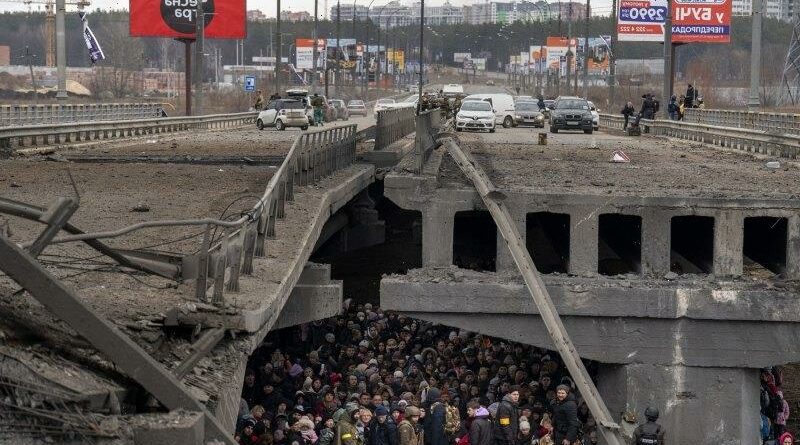Putin threatens Ukraine, says nation’s ‘statehood’ at risk due to ongoing resistance
As Russian forces strengthened their hold on parts of southern Ukraine Vladimir Putin has intensified his rhetoric, saying the “future of Ukrainian statehood” was at risk should resistance continue and warning that he considered sanctions imposed by Western nations to be “akin to a declaration of war”.
Putin’s threatening language comes in the face of ongoing international opposition to his invasion, with UK Prime Minister Boris Johnson to hold meetings with his Canadian and Dutch counterparts Justin Trudeau and Mark Rutte on Monday in the UK and the leaders of the Czech Republic, Hungary, Poland and Slovakia on Tuesday to discuss a unified response to the crisis.
Ukrainians crowd under a destroyed bridge as they try to flee across the Irpin River in the outskirts of Kyiv, Ukraine on Saturday.Credit:Emilio Morenatti/AP
On Sunday he laid out a plan to oppose Russian aggression in an essay for the New York Times. “Vladimir Putin’s act of aggression must fail and be seen to fail,” he wrote.
He called on world leaders to provide increased humanitarian and military aid to Ukraine, increase economic pressure on Russia and bolster NATO and nations opposed to Russia’s invasion. But he said Russia’s opponents must remain open to diplomacy and efforts to de-escalate the crisis.
Over the weekend Israeli Prime Minister Naftali Bennett met Russian President Vladimir Putin in the Kremlin on Saturday before speaking with Ukrainian leader Volodymyr Zelensky.
Despite international condemnation and stiffening sanctions the violence of the attack on Ukraine intensified.
Speaking during a televised meeting with flight attendants from Russian airline Aeroflot the Russian leader said that if Ukrainian forces “continue to do what they are doing, they are calling into question the future of Ukrainian statehood. And if this happens, it will be entirely on their conscience.”
A ceasefire planned to allow civilians to evacuate from the city of Mariupol failed to eventuate, with both sides accusing the other of failing to observe its terms.
Russian forces focussed attacks on the cities of Kyiv, Kharkiv, and Mykolayiv and attempted to seize the dam of the Kaniv hydroelectric power station, around 160 kilometres south of Kyiv on the Dnieper River according to reports from the Ukraine armed forces general staff on Sunday. On Sunday Russia claimed to have struck and disabled Ukraine’s Starokostiantyniv military air base with long-range high-precision weapons.
Since the invasion began Russian forces have targeted key Ukrainian infrastructure including nuclear power stations.
British military intelligence said on Sunday that Ukrainian resistance was slowing the Russian advance and had prompted its forces to attack population centres.
“The scale and strength of Ukrainian resistance continue to surprise Russia,” British military intelligence said in an update. Russia “has responded by targeting populated areas in multiple locations”.
“Russia has previously used similar tactics in Chechnya in 1999 and Syria in 2016, employing both air and ground-based munitions,” British military intelligence said. Russia has repeatedly denied that it is targeting civilian areas.
The head of the Chernihiv region said Russia has dropped powerful bombs on residential areas of the city of the same name, which has a population of 290,000. Vyacheslav Chaus posted a photo online of what he said was an undetonated FAB-500, a 500-kilogram bomb.
A crowd of mainly Ukrainian women and children wait to board a train to Lviv from the station in downtown Odessa on Saturday. Credit:Washington Post photo by Salwan Georges
“We want the Ukrainians to have the best opportunity to defend their homeland, and to protect women and children,” he said.
“Usually this weapon is used against military-industrial facilities and fortified structures,” Chaus said. “But in Chernihiv, against residential areas.”
In a speech to Ukrainians on Saturday President Zelensky pointed to “the 500-kilogram bombs that were dropped on the houses of Ukrainians. Look at Borodyanka, at the destroyed schools, at the blown-up kindergartens. At the damaged Kharkiv Assumption Cathedral. Look what Russia has done.”
Russian media cited an unnamed source on Sunday as saying that Ukraine was close to building a plutonium-based “dirty bomb” nuclear weapon, although the source cited no evidence.
The TASS, RIA and Interfax news agencies quoted “a representative of a competent body” in Russia on Sunday as saying Ukraine was developing nuclear weapons at the destroyed Chernobyl nuclear power plant that was shut down in 2000.
Australian Defence Minister Peter Dutton told ABC television’s Insiders program that Australian military aid had reached Ukraine with the assistance of the US and the UK.
“Our desire is to see the Ukrainians extract a very significant cost on the Russians, both in terms of their reputation and their so-called military might,” he said.
More than 11,000 Russian troops have been killed since Moscow launched an invasion of Ukraine on February 24, the Ukrainian armed forces’ general staff said on Sunday. A day earlier, it put Russian casualties at over 10,000. It did not report Ukrainian casualties.
According to the United Nations more than 1.4 million people have fled Ukraine since the invasion began.
With AP, Reuters
Most Viewed in World
From our partners
Source: Read Full Article





